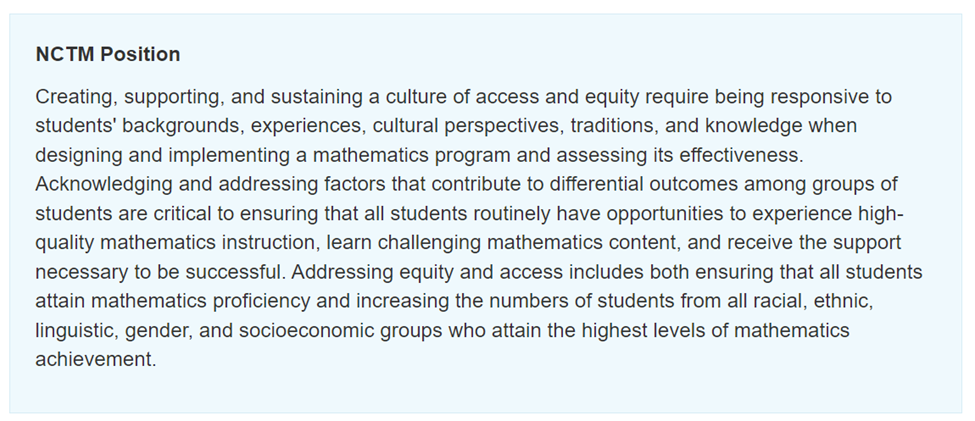It is well known that the students in our schools and classrooms are increasingly diverse in terms of cultural, linguistic, and cognitive strengths and backgrounds. In her opening message for this calendar year, the commissioner has challenged us as educators to work collectively to “ensure all students are equipped with what they need to thrive during their educational journey” and “address challenges and tear down barriers to student success” (RIDE, August 2023). This call-to-action aligns with NCTM’s (the National Council of Teachers of Mathematics) position on access and equity which states:

(NCTM, April 18, 2014. Access and Equity in Mathematics Education: A Position of the National Council of Teachers of Mathematics.https://www.nctm.org/Standards-and-Positions/Position-Statements/Access-and-Equity-in-Mathematics-Education/)
As mathematics educators, RIMTA’s Access and Equity Committee is excited to share that we will be hosting a series of free collaborative learning sessions this spring aimed at helping Rhode Island educators support our increasingly diverse student body and NCTM’s and RIDE’s mission to break down barriers and provide access to high-quality learning and academic success for all learners.
Specifically, the goals for the three spring professional learning sessions are to:
-
develop a refined understanding of what access and equity look like in PK-12 mathematics classrooms,
-
promote pedagogical practices that will support access and equity for mathematics learners, and
-
strengthen educators' confidence in their ability to facilitate effective and impactful mathematics teaching and learning.
The sessions will center the Project MINE: Mathematical Intersections of Noticing and Equity work of the Mathematics Teacher Noticing team out of the University of Kentucky. As the project title indicates, this work highlights the value of combining research around three key components of effective teacher noticing (attending, interpreting, and deciding; Thomas et al., 2014) with key dimensions of educational equity (access, achievement, identity, and power; Gutierrez, 2009). More specifically, the modules within this project support educators’ ability to (a) attend to the variety of strengths and perspectives students bring to their mathematical thinking and problem solving, (b) interpret what that thinking indicates about students’ level of understanding through an equitable lens, and finally (c) use that information to decide what instructional moves will best promote access and achievement for each student.
Through rich discussion around short classroom videos and language often used within professional conversations, the Project MINE modules will help us as mathematics educators from across districts engage in critical reflection around our own practices and beliefs related to students’ diverse mathematical strengths, personal identities, and community assets. It is our hope that this collaborative professional learning will then be brought back to and shared within our individual schools to help support NCTM’s work to address “factors that contribute to differential outcomes among groups of students” to ensure that “students from all racial, ethnic, linguistic, gender, and socioeconomic groups (can) attain the highest levels of mathematics achievement” in our state’s schools (NCTM, Access & Equity Position Statement, 2014).
Session Overview
|
Date, Time
|
Session Focus
|
|
Jan. 17, 6:30-7:30pm
|
Introduction to Project MINE's foundational frameworks: Thomas and colleague's (2014) three components of professional noticing (attending, interpreting, and deciding) and Gutierrez’s (2009) four dimensions of Equity (access, achievement, identity, and power)
|
|
March 13, 6:30-7:30pm
|
Broadening perceptions of "smartness" and ability and the use of number talks to empower students to use diverse strengths in the mathematics classroom
|
|
May 15, 6:30-7:30pm
|
Language development and multilingual learners & challenging the perception of mathematics as a universal and culturally neutral language
|
How Can I Get Involved?
To promote equitable access to this learning opportunity:
-
sessions are open to all interested educators who are open to engaging in this work and willing to set up a free, RIMTA Basic Membership (this will support our ability to communicate with you and support your ongoing professional learning);
-
all sessions will be held virtually on Wednesday evenings;
-
you may attend as many or as few of the sessions as you can/wish; and
-
pre-readings/resources will be available to enhance your learning but they will not be required.
Steps to sign-up:
-
If you are already a RIMTA member, you can simply go to rimta.net, click on the “Events” tab at the top of the page, and complete the registration form..
-
If you are not currently a RIMTA member you will need to complete 2 steps:
-
-
First, go to rimta.net and click on the “Membership” tab at the top of the page. Choose the membership level that you feel is right for you and then complete the membership application.
-
Second, once you get a confirmation email for your membership, then you can go back to rimta.net, click on the “Events” tab at the top of the page, and complete the registration form.
If you have any questions or difficulties with this process you can contact one of the committee co-chairs: Liz Brownlee (elizabethbrownlee@rimta.net) or Sara Donaldson (saradonaldson@rimta.net).
